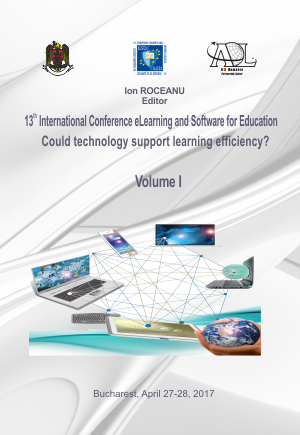HUMAN OPERATOR - REAL REMOTE ENVIRONMENT INTERACTION TECHNIQUES FOR EDUCATIONAL ACTIVITIES
HUMAN OPERATOR - REAL REMOTE ENVIRONMENT INTERACTION TECHNIQUES FOR EDUCATIONAL ACTIVITIES
Author(s): Radu-Cătălin Tarcă, Ildiko Margit Pasc, Florin Avram, Florin Popentiu -VladicescuSubject(s): Social Sciences, Education, Higher Education
Published by: Carol I National Defence University Publishing House
Keywords: interaction techniques; teleoperation; direct control; supervisory control.
Summary/Abstract: Along with the wide spreading of internet communications new applications had emerged, which, step by step, eventually concluded not only in information transmission but in developing new command techniques and remote sensors data reading. This is made not only for scientific or industrial purposes but also to develop remote controlled educational laboratories . Internet telerobotics have emerged in recent decades, having direct control (a command is send directly to the actuators with no intervention by a computer [6]) and supervisory control (the computer processes the human command using its own programmed intelligence to determine the final command) as the main teleoperation paradigms. Both paradigms are difficult to be use in any applications which operate in an unstructured and dynamically changing environment, because none of them cannot assure adequate interaction sensing device to the human operator That is why many researchers try to find new ways to solve some of the issues or offer solutions for fault diagnosis in this field . Some researchers investigate how to develop mobile robot teleoperation systems that use existing wireless infrastructure and present the design and development of WAP-based system for such applications. The movement of the mobile robot is controlled by the operator through a mobile phone using for this the visual feedback from a video camera mounted on the robot. Other researchers are based on techniques like "abstract mobile agents". This approach provides the functionality of all other distributed computing systems in an undefined environment. This technique can provide multiple-robot system developers that can include a wide range of options for initial development and future extension, and also an intuitive and robust design environment. The authors have developed a new architecture for networked robots using mobile agents. They also investigate the feasibility of extending adaptability and fault-tolerance. The authors state that mobile agents offer many opportunities for the extension of functionality in multiple-robot systems. The authors describe some of the possibilities of using internet access for teleoperation, stating that many systems in this field are using HTTP together with gateway interface (CGI). A limitation for this method is a slow response speed. Another problem is that this system doesn't have a real-time remote control due to the fact that a complete HTML page has to be generated for each request, while the resulting page remains static.The researchers suggest a new type of interactive control "active supervisory control" paradigm. The developed application is used for Internet-based wheeled robot teleoperation. This system has two main components: a basic teleoperation system which uses a joystick commands, and an advanced teleoperation system which uses linguistic commands. Each command (from joystick or linguistic) is defined with multiple events and the corresponding response functions in designed to perform independent tasks. In this way is offered a friendly remote control system for robot navigating in an unknown and dynamic environment, enabling a natural design philosophy. In this paper an application related to web - based laboratory architecture is presented, which can be used in educational laboratories and can be easily extend for educational e-laboratories, too.
Journal: Conference proceedings of »eLearning and Software for Education« (eLSE)
- Issue Year: 13/2017
- Issue No: 01
- Page Range: 109-114
- Page Count: 6
- Language: English

